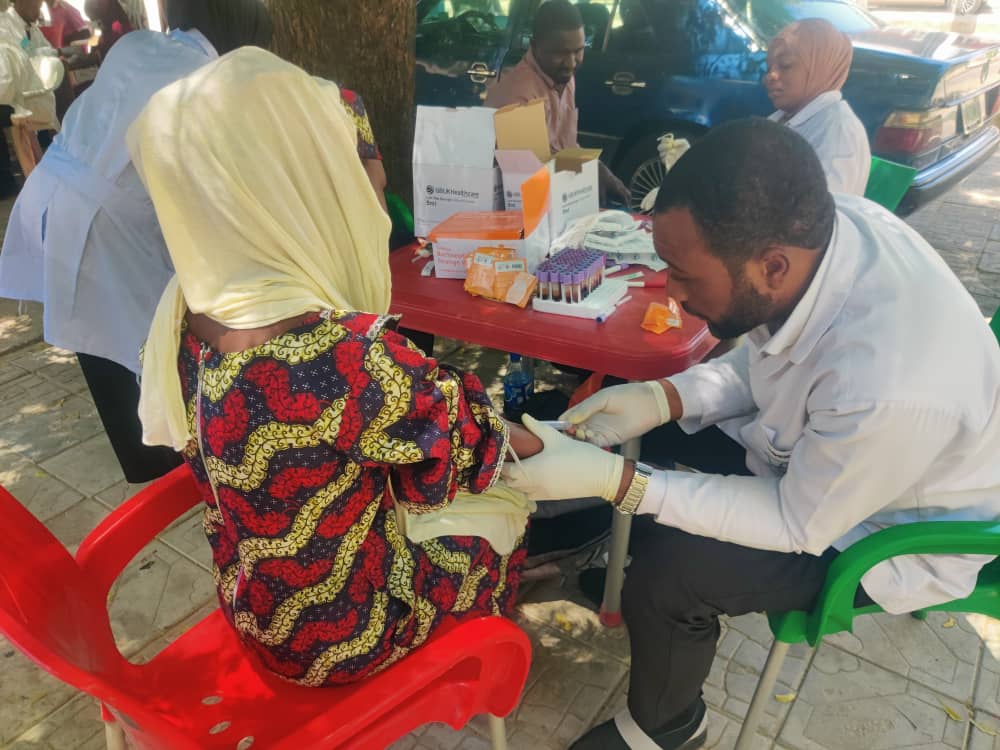BY: NEWS EDITOR, APRIL 20, 2025/ 03:58PM
In commemoration of the International Week of (Bio)Medical Laboratory Science, the Young Medical Laboratory Science Forum (YMLSF) Borno State Branch organized a one-day free blood group and genotype testing outreach in Maiduguri.
The event, themed 'Biomedical Science: Building Healthier Communities through Diagnostics,' was held in collaboration with the Borno State Ministry of Health, University of Maiduguri, Medicine Sans Frontiers (MSF), and other partners.
The outreach, which targeted 5,000 individuals, was conducted at three centers across the state: University of Maiduguri Teaching Hospital (UMTH), State Specialist Hospital (General), and BM Diagnostics Centre.
In an interview with our reporter, the Chairman of YMLSF Borno State Branch, MLS Wathanafa Madu Gadzama, explained that the initiative aimed to reduce the number of sickle cell victims in the state and beyond by encouraging people to know their genotype and make informed decisions.
'We noticed the high trend of the emergence of sickle cell disease especially in our state and in general Nigeria, and the cause of sickle cell disease is a preventable disease.
'When carrier threat parents are not married, we cannot have sickle cell children. When a carrier and a carrier meet, they have a tendency of giving birth to a sickle cell child. That's why we're advocating to the people and the policy makers in government that haemoglobin genotype should be one of the basic screening tests we do in premarital testing before we join two intending couples in marriage,' he explained.
Also speaking, MLS Amina Usman Abubakar, one of the staff, highlighted the importance of knowing one's genotype, especially in the context of marriage and family planning.
'We choose to screen for genotype and blood grouping because of how prevalent sickle cell disease is in our community.
'Our parents made mistakes that we don't want to repeat. Now that we have access to healthcare and testing, it's crucial to know our genotype to avoid incompatible marriages,' she said.
She emphasized that knowing one's genotype early can help prevent mistakes in relationships.
'If you're 15, 16, or 17, you should know your genotype before falling in love or into any relationship.
'This way, you can inform your potential partner during the introduction stage, and it's easier to end the relationship if you're incompatible,' she advised.
Beneficiaries of the outreach expressed gratitude to the organizers.
Bashir Muhammad, a father of two, said he had been eager to know his blood group and genotype but never had the opportunity until he saw the outreach banner on social media.
'I quickly informed my friends, and we got tested,' he added, thanking the organizers and urging others to take advantage of such initiatives.
Fatima Modu Lamba, 22, and her 1-year-old sister were also beneficiaries.
Fatima said she was happy to have finally fulfilled her long-held plan to know her blood group and genotype.
'I came with my sister so she wouldn't repeat the mistake I made,' she said, expressing her appreciation for the outreach.
The YMLSF's effort is a step towards building healthier communities through diagnostics, and such initiatives are crucial in raising awareness about the importance of knowing one's genotype and blood group.

